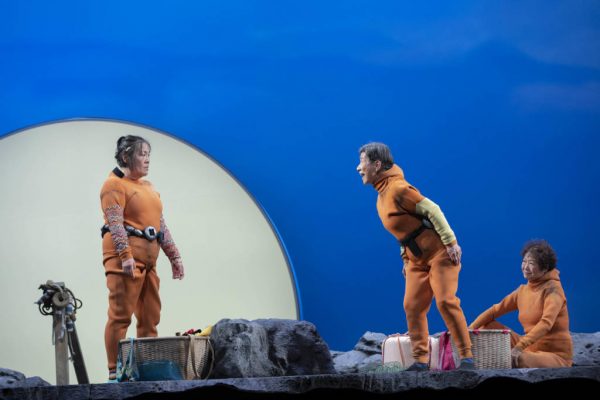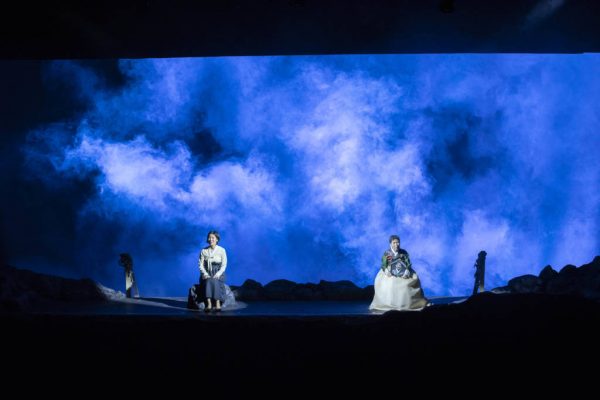Theater Review: The Sense of an “Endlings”
By Bill Marx
The playwright supplies a memorable encounter between young and old in the play’s final scene, but it is too late to compensate for the superficiality of the Pirandello-lite antics that have come before.
Endlings by Celine Song. Directed by Sammi Cannold. At the Loeb Drama Center, 64 Brattle Street, Harvard Square, Cambridge, MA, through March 17.

Emily Kuroda, Wai Ching Ho, and Jo Yang in the A.R.T. Production of “Endlings.” Photo: GretjenHelene.com
Given entrepreneur Diane “Broadway or Bust” Paulus’s enthusiasm for boffo musicals, straight plays are an endangered species at the American Repertory Theater. So, in support of the non-musical, I took in Endlings, which turned out to be less of a drama than a serio-comic meditation on writing a drama. Playwright Celine Song is conflicted about how to value her Korean background — as well as how to write about it with imaginative respect. She draws on meta-theatrical antics as the means to make her uncertainty entertaining and/or compelling. The fragmented proceedings revolve around the challenge of creating an identity that goes beyond assimilation, that does justice to the dreams of the present and the injustices of the past. But, ultimately, exploring the ways historical material can be exploited and/or honored isn’t nearly as satisfying as supplying powerful confrontations. To her credit, Song supplies a memorable encounter between young and old in the play’s final scene, but it is too late to compensate for the superficiality of the Pirandello-lite antics that have come before.
The first act deals with a trio of very elderly haenyeos, South Korean women who dive into the ocean to harvest seafood for the markets. Understandably, the job is disappearing, a casualty of progress, along with the horrific isolation of the island and obvious threat to life and limb. The three courageous females who remain on the sea hunt, Go Min (Emily Kuroda), Han Sol (Wai Ching Ho), and Sook Ja (Jo Yang), are divided into types — the tough, the glamorous, and the no-nonsense. Tangy characters all (barking out lots of ‘fucks’ for easy laughs), they tell us — sometimes with comic reluctance — about the trials and tribulations of their trade, their hard existences, dead husbands, and ungrateful children, with a parodic assist from a TV style voiceover whose chirpiness undercuts the pathos of the women’s lives.
These scenes, though heartily acted, feel half-hearted, predicable in their picture of the women’s quiet desperation and stubborn resistance. It is as if Song is, self-consciously, giving into a salt-of-the-earth caricature of these survivors. And perhaps that is part of the playwright’s strategy, a hollowness that mitigates the females’ everyday heroism. At one point, Ha Young, a Korean-Canadian Manhattanite in her late 20s (a stand-in for the playwright) pops up to tell us about her family members traumatic experience in ’50s Korea, their eventual immigration to America, and her struggle to make ends meet living as a playwright in New York, stuck in a mouse-ridden apartment. She is caught between wanting to write plays that make money in “the great white theater” and those that express a self that is yet to be discovered.
So far so conventional. What helps the material, mightily, is the terrific set design of Jason Sherwood and the agile lighting of Bradley King. Behind the playing area’s rocky shore comes an eye-popping explosion of bright colors — blues and purples. Also, for the underwater interludes, a tank has been built below the performers playing area, with sliding doors that give us glimpses of the women gliding by, or the occasional flap by of a giant green sea turtle. Of course, this is a prime example of the A.R.T. ‘s ‘show me the money’ approach — choreographed movements and puppets would have been just as effective, but that would have called on the audience’s imagination and, in today’s market, the literal sells. (“Show me the water!”) Still, the under-the-sea business is carried off gracefully — there is just enough of it without milking it — at least until we reach the talking clams. Then you might just want the sliding doors locked tight.

Jiehae Park and Wai Ching Ho in the A.R.T. production of “Endlings.” Photo: GretjenHelene.com.
Endlings is always beautiful is look at, but then comes the second act to fog up the aesthetics. We start off in the New York apartment of the playwright, after she has given her husband (wearing a placard that reads “white husband”) the script of Endlings to read. I don’t want to give away any of the surprises, such as they are, but there is nothing here, either politically or theatrically, that’s particularly subversive or audacious, despite the proclamations of A.R.T. marketing and Boston’s stage critics. ‘Cutting” satires of the privilege of being “white” in America have become routine in American theaters (for example, The White Card). The comedy on this and other issues borders on SNL level, while the touches of the whimsical are heavy-handed and solution-orientated. I feared the worse, given the dramatist’s statement in the program notes that writing the script give her the wisdom “to be herself.” (So many new plays dealing with identity are really about reassurance: to both liberals and conservatives. Good old American individuality is huzzahed; the notion of creating alternative communities, ignored.) But Endlings‘s wind-up is affecting, a dreamy confrontation between new and old that came close to generating genuine conflict — neither side is right or wrong, and identity might be as much a matter of losing yourself as it is about ‘being’ yourself.
Ironically, Song’s playwright talks a lot about community, but via multiple mentions of real estate. Yes, it is a metaphor, but Ha Young lives in a sketchy New York apartment. And that is real enough. For the Arts Fuse, Debra Cash recently posted a piece about how writers are making less then ever before for their work (“In the past decade, authors’ earnings overall have declined 42%”); she details an attempt by the Authors Guild to fend off mega-businesses, such as Amazon, who are using their clout to reduce payments to writers. Revealingly, the week Endlings opened, there came a happy announcement about A.R.T. real estate — a $100 million gift (from Harvard University alumnus and hedge fund manager David E. Goel and his wife Stacey) that will fund development of a new “state-of-the-art research and performance center” in Allston, which will also be home to a new location for the A.R.T. With this expansion, one of the leading regional theaters in the country will presumably grow as an incubator of commercial musical productions headed for Broadway. Ah, Trump’s America — the super-rich hand millions over to a major university to make life more exciting for tourists. Sometimes, to really appreciate the drama that is real estate, you have to look at what is happening offstage.
Bill Marx is the editor-in-chief of The Arts Fuse. For over three decades, he has written about arts and culture for print, broadcast, and online. He has regularly reviewed theater for National Public Radio Station WBUR and The Boston Globe. He created and edited WBUR Online Arts, a cultural webzine that in 2004 won an Online Journalism Award for Specialty Journalism. In 2007 he created The Arts Fuse, an online magazine dedicated to covering arts and culture in Boston and throughout New England.

Omg this is spot on … just saw it last night …anytime you see the playwright in their own play you are in trouble…and those clams 🙂